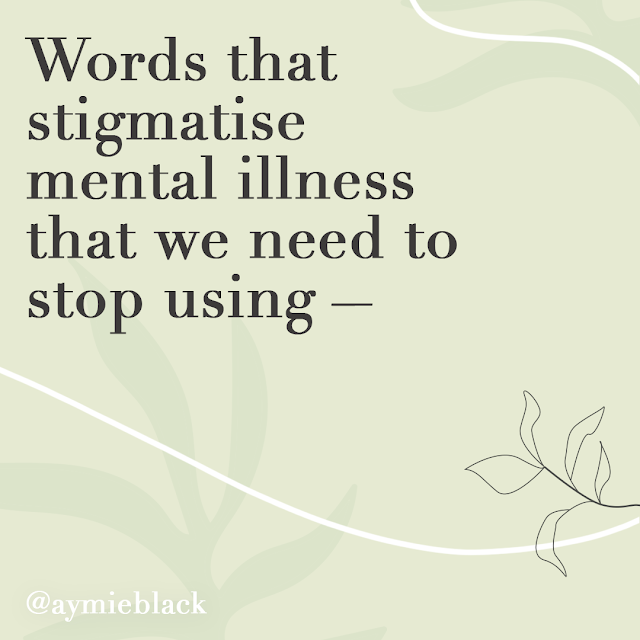Mental health advocacy has come a long way but unfortunately many people still use words that further the stigma around mental ill health.
We're all a work-in-progress, this isn't about cancelling people - this is about educating others. I know I have unknowingly used words in the past which reinforce negative stigma, so I know that nobody is perfect. We're all capable of making these positive changes, so below I've listed a non-exhaustive list of words and phrases to avoid, with a brief explanation why they are offensive and I offer some alternatives you can use.
This article is based from my guide on Instagram which you can view here.
Insane/Lunatic/Unhinged/Disturbed:
These terms were used to reinforce negative stereotypes of those with mental health issues, furthering the stigma that 'people with mental health conditions are to be feared'.
Here are some alternative words you could use that are not offensive: silly, absurd, ridiculous, bizarre, erratic, irrational, strange, weird, scary, unpredictable.
Using 'not well' as an insult:
What do you mean the person on Love Island you dislike is 'not well'? Think about what this implies about mental illness.
Using mental illnesses as an insult: e.g. schizo/bipolar/psychotic/anorexic
Ill mental health isn't a laughing matter, and these insults reinforce a negative perception of mental health conditions (and... it's also pretty offensive).
Using illnesses as a means of description: e.g. 'I'm so OCD', 'The weather's bipolar'
This trivializes the complexities of mental health issues and spreads stigma and misinformation.
Hospital stigma: 'There's a place for people who talk to themselves'/'They should go to the hospital'/'The Looney Bin'
People go to hospitals to receive treatment so that they can get better. People with conditions that require hospital treatment are just human beings who needs some support, they're not villains. Also, speaking of hospitals in this way can create a barrier for those accessing treatment as a result of that stigma.
'Suffers from'/'Mentally ill person':
Using 'suffer when referring to someone with a mental health condition applies negative connotations to mental illness which can cause people to struggle to accept help for their condition, or accept diagnosis.
Instead of saying 'suffers from', or referring to someone as 'mentally ill', say someone 'has a mental illness' or 'lives with a mental illness'. Likewise, you should say 'she has bipolar', not 'she is bipolar'.
Talking about suicide with consideration:
Suicide is a tragedy, which requires great care when discussing it. Avoid using terminology like 'commit suicide', and instead say 'died of suicide'. Also, instead of saying 'unsuccessful suicide', use 'suicide attempt'.
A lot of the language around suicide has crime connotations, so let's be more supportive to those affected by suicide by avoiding those words and phrases.
The only way we can eradicate stigmatising language is by doing our best and educating others. Nobody is perfect, and many of these words we have a habit of using, but there's always time to change.
Want to read more? Check out:
https://www.time-to-change.org.uk/media-centre/responsible-reporting/mind-your-language

